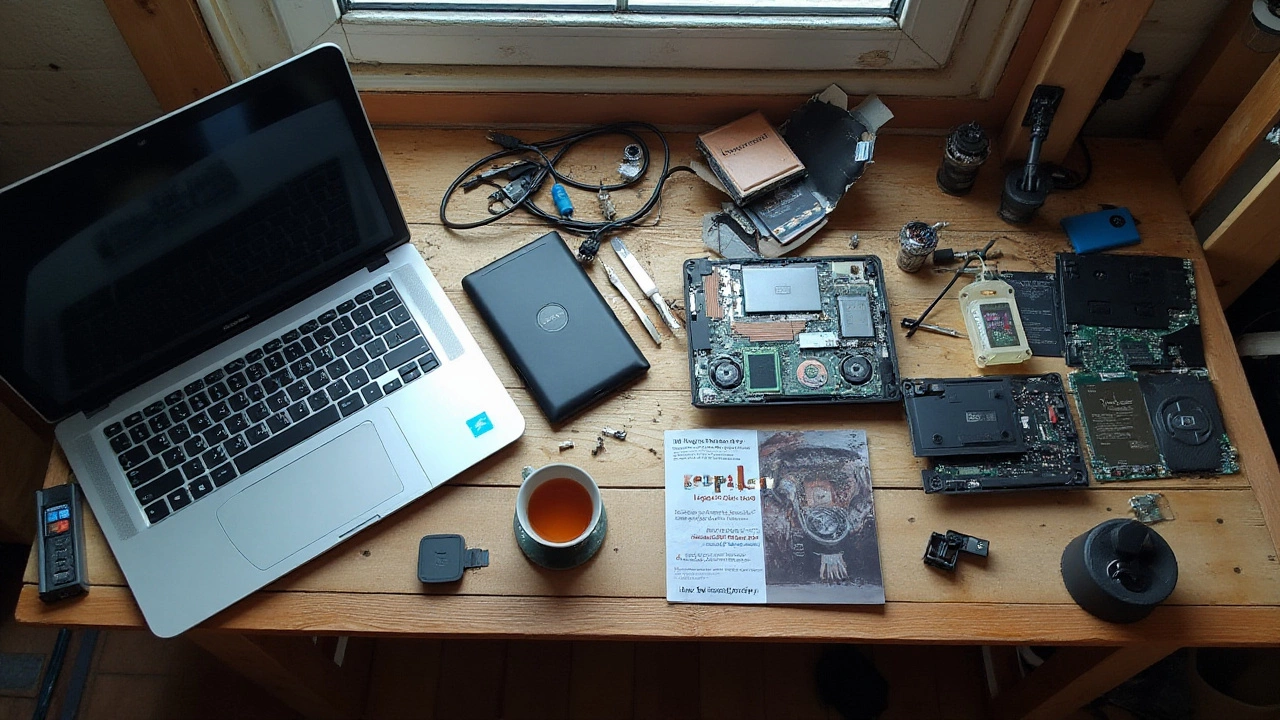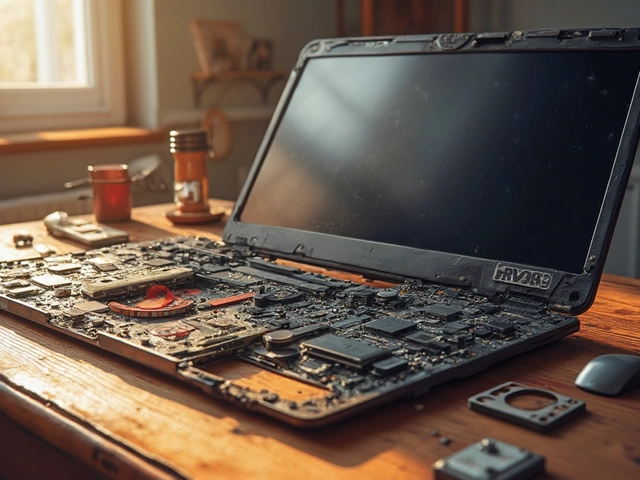In our tech-driven world, laptops are essentials, much like a trusty old friend that aids us in both work and play. But just like any piece of machinery, they too have their off days. When faced with a flickering screen or a power issue, the big question looms: is it time to fix it or is it better to replace it?
This isn't just about money—though let's be real, that's a big part of the equation. It's also about weighing convenience, environmental impact, and sentimental value. In this piece, we'll delve into these aspects to help you make an informed choice when your laptop starts showing signs of wear and tear.
- Understanding Repair Costs
- Common Laptop Issues
- When to Repair Vs. Replace
- DIY Repairs: Risks and Rewards
- Choosing the Right Repair Service
- Maximizing Laptop Lifespan
Understanding Repair Costs
When your laptop starts malfunctioning, the first thing that often comes to mind is the potential cost of fixing the issue. This can be quite the Pandora’s box, with a variety of factors at play that influence the final bill. Many laptop repair costs can range from minor issues like a loose key or sticky trackpad, up to significant hardware replacements such as motherboards or screens. Each component comes with its own price tag, plus the labor cost. Labor costs can differ significantly based on where you live and the complexity of the repair. Large cities might charge more than smaller towns, a fact that surprises some. Meanwhile, if you decide to go with an official service center, you might pay a premium compared to a local repair shop, up to 30% more, due to the branded service charge.
While some issues might seem minor, they can escalate quickly. A laptop dropping from a table might only have a cracked screen at first look, but internal damages could arise over time, posing additional costs. Say, the power supply might start failing, or the battery could refuse to hold a charge, all linked to the same drop. Meanwhile, common laptop repair problems include malfunctioning displays, failed hard drives, corrupted software, or relentless pop-ups from malware. These issues might sound like technical gibberish to some, but each of them has its own associated costs—software repair fees, hardware replacement costs, and new parts pricing all add to the bill. For instance, a new screen might set you back anywhere between $150 to $300, and that's excluding labor.
There’s a surge in DIY enthusiasm among tech-savvy individuals who revel in tackling minor repairs by themselves. Yet, these brave souls should proceed with caution; today's laptops are more sophisticated than the blocky machines of the past. Opening one up without the right skills could lead to additional damages, creating a rather expensive fix. Some find solace in online forums or video tutorials, but remember, each laptop model has unique challenges. In fact, a report by Consumer Electronics estimates that mishandling repairs can triple initial repair costs.
"Repair is a critical competence for our future survival on this planet. It helps us to create a more circular economy," says Ugo Vallauri, co-founder of The Restart Project.
When weighing the repair option, many are astounded to find a slew of hidden costs. Sometimes, after investing heavily in repairs, users find the performance improvements negligible, leading them to conclude a replacement was a more viable option from the onset. A thorough diagnostic by a professional can illuminate these hidden issues. Yet, as you weigh the laptop repair option, leasing out your repair might be influenced by your laptop's age. Typically, machines that are over four years old might struggle to support the latest software or operating systems, complicating repair feasibility further. Maintenance, too, is a cost factor when considering how long repairs might last. Mounting repair bills can become frustrating, considering the cycle costs can quickly accumulate over time, pushing the threshold of repair-worthy durability.
Common Laptop Issues
The realm of laptop repair is varied and often daunting. But fear not, it begins with understanding the common issues that most devices face over time. One of the most frequent complaints is the laptop suddenly overheating. This usually happens because of dust buildup or a failed fan, leading to breakdowns or even permanent damage if left unchecked. Regular cleaning can do wonders, much like maintaining a car, it ensures your device runs as cool as a cucumber. In fact, research has shown neglecting such maintenance can shorten a laptop's lifespan by several years.
Keyboard and Screen Glitches
Another area where people struggle is with stubborn keyboards and erratic screens. We often find that after a coffee spill—possibly during a groggy morning—keys become sticky or unresponsive. Sometimes, it's just a matter of replacing individual keys or cleaning under the keyboard. But be wary, a complete keyboard replacement might be necessary, and at that point, it's crucial to weigh your repair costs wisely. Similarly, screens can become a psychedelic haven of pixels going wild, often due to outdated drivers or hardware issues. Verify if updating your software resolves the problem before running off to the nearest tech shop. In some cases, it could be as simple as properly reconnecting a cable inside the laptop, especially if you feel brave enough to pop open the case.A disturbing trend among tech users is the sudden crashing or freezing of laptops—a nightmare especially in the middle of an important task. This can often hint at a failing hard drive or inadequate RAM. Backup your data regularly, because once that hard drive fails, you're in a tight spot. Trust me, I’ve seen graduates lose their thesis this way! Investing in cloud solutions or external drives can prevent such misfortunes.
"It is often said that prevention is better than cure, and this holds remarkably true in technology maintenance," says the tech guardian from TechCrunch.
Battery problems also plague many users. Does unplugging the charger spell doom for your laptop's power? Perhaps the battery needs recalibrating or replacing. Remember, laptop batteries are like our pet Muffin – they need care and a leash when they wander too far. Understanding and maintaining battery health is vital, as it directly influences laptop longevity.
Wireless Connectivity and Sound Issues
Connectivity hiccups are another common complaint. Nothing is more maddening than your Wi-Fi dropping during a crucial video meeting. Often, this involves examining the network drivers or disabling Wi-Fi scanning settings that interrupt stable connections. Similarly, when you realize that Spotify isn’t broken, but your speakers are, it’s time for diagnostics. This problem could range from driver updates to sound card replacements.As you can see, many of these laptop maintenance dilemmas can be addressed without professional intervention initially. However, if these suggestions do not solve the issue, it’s worth seeking professional advice. Engaging in early diagnostics can save a lot of stress and potentially a lot of money.
| Issue | Possible Solution |
|---|---|
| Overheating | Clean fan and vents |
| Keyboard Issues | Replace keys or clean keyboard |
| Screen Problems | Update drivers or reconnect cables |
| Battery Problems | Recalibrate or replace battery |

When to Repair Vs. Replace
Deciding whether to dive into laptop repair or to take the leap and buy a new one is a bit like choosing between fixing an old car or trading it in for a newer model. It's about weighing costs against benefits, but also considering the emotional attachment you might have to your trusty device. The first thing you might want to assess is the age of your laptop. Typically, if a laptop is over three to five years old, and the repair costs are more than half the price of a new one, it might be wiser to choose replacement. Laptops, like all tech gadgets, have a life expectancy, and sometimes technology progresses so quickly that what was cutting-edge just a few years ago may struggle to handle today's software demands.
However, not all repairs are created equal. Some issues are trivial and inexpensive to fix. For instance, swapping out a faulty battery or upgrading the RAM could breathe new life into your machine without breaking the bank. But for major hardware failures like a motherboard or significant damage from water exposure, you might find yourself better served by investing in a new laptop. Not to mention the principle of diminishing returns: spending large sums on repairs may not increase the usable lifespan of your laptop by much.
"It's essential to weigh the cost-benefit dynamics carefully," says a spokesperson from PC Magazine. "Remember, the rapid pace of technology means newer models often bring enhanced performance and features that may be worth the investment."
Let's not forget about the environmental impact. Disposing of laptops unnecessarily contributes to e-waste, which poses an environmental concern. Repairing might be the eco-friendly route, particularly for minor issues. On the flip side, if you're running energy-draining tasks on a prehistoric laptop, upgrading to a modern, more energy-efficient model could potentially reduce your carbon footprint. Of course, financial considerations cannot be understated. If you're on a budget, repairing your laptops might make more sense in the short term, even if a complete replacement is ultimately inevitable down the line. You can take strategic steps toward this decision by maintaining regular backups and avoiding further damage, ensuring you have flexibility and options at your disposal. In a survey, around 55% of users reported they prefer repairing to preserve data and avoid downtime.
DIY Repairs: Risks and Rewards
Embarking on a DIY repair journey for your laptop can indeed be both an adventure and a challenge, wrapped into one. If you're tech-savvy, the allure of fixing your own laptop issues can be quite tempting. For the confident tinkerer, it means bypassing repair costs, and there's a certain satisfaction in bringing your beloved machine back to life with your own hands. However, it's crucial to understand the potential risks involved before you dive in. Mishandling sensitive components can lead to further damage, possibly voiding any existing warranty. If you're not careful, what starts as a simple fix could escalate into a major problem, leaving you worse off than before.
One common repair challenge is when dealing with a cracked screen or failing keyboard. These might seem simple at first glance; however, they demand patience and precision. It's easy to misplace screws or pry too hard at delicate parts, especially if you are attempting it for the first time. Manuals and online tutorials make the task appear straightforward, but in practice, things often go awry, as minor mistakes can lead to costly consequences. On the flip side, successfully fixing minor issues yourself can save money and is immensely rewarding, boosting your confidence in handling future repairs.
According to a report by the Digital Economy: "The average laptop repair cost in the US ranges from $100 to $250, depending on the issue." By doing it yourself, you might save this amount. But remember, knowledge is power. It’s important to research thoroughly, watching guides or reading through forums where others share their experiences. And, of course, having the right tools is non-negotiable. Investing in a quality toolkit can make a world of difference in ensuring a smoother repair process. As appealing as it may sound to work without professional help, it's essential to weigh these financial savings against the possibility of incurring additional damages.
Not every issue is DIY-friendly. For instance, a damaged motherboard or obscure power failures oftentimes require specialized skills and equipment. Attempting repairs on such components can be more akin to traversing a minefield unless one is highly knowledgeable. A riskier but rewarding method, some enthusiasts even perform board-level repairs, which include soldering small parts back onto the motherboard – a highly skilled task that should only be attempted if you're experienced in electronics. In cases where there’s exposure to liquid damage, professional intervention is usually unavoidable, as it demands specialized equipment to clean and possibly replace intricate parts.
Ultimately, whether DIY laptop repair is suitable for you depends on your level of expertise and patience. If you choose to proceed, start small. Take on manageable repairs like battery or RAM replacements before trying your hand at more complex tasks. Assess each situation individually, and don't shy away from consulting experts when necessary. Online communities can offer significant support, and sometimes stepping into a workshop with the pros can teach you more than any YouTube tutorial could. But if unsure, err on the side of caution. You wouldn't want to turn a minor glitch into a costly learning experience.

Choosing the Right Repair Service
When it comes to selecting a repair service for your beloved laptop, the decision can often feel like searching for a needle in a haystack amid countless options. The right choice, however, can make all the difference in not only your wallet but also your peace of mind. To start, consider the reputation of the repair service. Customer reviews and ratings on platforms such as Google Reviews or Yelp can provide insights into the experiences of others, highlighting everything from pricing transparency to quality of service. It's wise to be skeptical of reviews that sound too polished or repeatedly mention the same positive detail, as they may not be entirely genuine.
Experience is another crucial factor in your decision-making process. Inquire about the company’s history and the expertise of their technicians. A team with seasoned professionals is likely to diagnose and resolve issues more swiftly and accurately. It's worth noting that big-name stores often charge more, yet might not necessarily offer better service. Independent repair shops staffed by passionate technicians frequently provide excellent, yet more affordable, options. Always ask if they offer a warranty on repairs. A dependable shop will stand by their work, pledging to fix any post-service complications within a reasonable timeframe. Laptop repair isn't just a skill—it's an art, and you deserve artisans who take pride in their craft.
While cost is a significant concern, the cheapest option isn't always the best. Sometimes cutting corners can lead to further issues down the line. Before committing, get an estimate and ensure it includes labor, parts, and any potential hidden fees. It's helpful to compare this with other quotes to judge competitiveness. Some repair services, especially those online, may offer diagnostic assessments for free or a small fee which can save you if the laptop isn't worth repairing. An interesting fact to note: according to a consumer report, nearly 30% of laptop repairs are related to damage that could have been prevented, emphasizing the importance of handling and maintaining your device with care.
Consider Specialty Services
Some repair shops specialize in specific brands or types of laptops, such as gaming laptops, which can be a boon if your device falls into one of these categories. These specialists often have access to specific parts and the know-how to address brand-specific issues more deftly. Also, if your laptop is under warranty, reaching out to the manufacturer's certified service center is recommended to avoid any voided agreements. A wise man once said, "A stitch in time saves nine," and investing time in finding the right repair service can save you future headaches.
Maximizing Laptop Lifespan
Your laptop is a bit like a car—take good care of it, and it might stay with you much longer than you'd expect. One of the most impactful things you can do is ensure that your device is always kept cool. Overheating is a silent killer for many electronics, and laptops are no exception. Make sure you use a cooling pad if you're handling tasks that demand a lot of processing power, or simply place it on hard, flat surfaces where ventilation isn't blocked. Dust is another enemy, creeping in through vents and clogging fans, which could lead to overheating. Regularly clean these areas using compressed air to blow away the debris. You'll want to do this gently so as not to damage any of the little parts inside.
Battery care is crucial to your laptop's lifespan too. Everyone likes to think their device can hold a charge forever, but even lithium-ion batteries have their breaking point. Some experts suggest keeping your device plugged in can slowly erode the battery's capacity over time. Try cycling through full charges and discharges once in a while; it keeps the electrons flowing, maintaining the battery's health. However, it's also wise not to let your laptop fully drain all the time—it adds unnecessary stress on the battery. Consider configuring power settings to preserve battery health and maximize power efficiency when you're away from a socket.
Looking after the software aspect is just as important as the hardware. Keeping your operating system and drivers up-to-date ensures you have the latest patches and updates that are crucial for security and performance optimization. It's easy to forego these updates when they seem to turn up at the most inconvenient times, but delaying them for too long could lead to unexpected problems. Regularly clearing out junk files and performing disk cleanups can also help maintain a healthy laptop.
Handling with Care
You would not take your car to a rocky off-road track if it was not built for that, right? Similarly, treat your laptop with the respect it deserves. Avoid dropping it or exposing it to moisture or extreme temperatures. Laptops are sturdy in their own way, but there is only so much abuse they can take. Always put them in protective sleeves when in transit; even the most careful person might experience a sudden rain or unexpected fall. The screen deserves special attention—don't press hard on it while cleaning, and invest in a screen protector if you often travel with your laptop. Consider using a docking station at your desk to minimize repeated connection and disconnection of cables, which can wear out ports more quickly.
According to longevity expert Kevin Boze, "Treat your laptop like a valuable tool it is, not just another commodity. Regular care can make a few years' difference in its lifespan."
Security is another big part of longevity. Like any piece of tech, laptops are susceptible to cyber threats. Installing a reliable antivirus and anti-malware program can protect against malicious attempts to compromise your data or performance. Regularly running scans and watching for unusual behavior helps too. Data backup is a wise practice, and cloud storage is a great option for preserving important files without eating up hard drive space.
Finally, know when it's time for a professional tune-up. Just as you take your car in for routine maintenance, visiting a repair shop can extend your laptop's life by optimizing performance and fixing small issues before they become real problems. Spending a little money on preventive care often saves a lot in the long run, not just in repair costs but by avoiding the need for early replacement.




